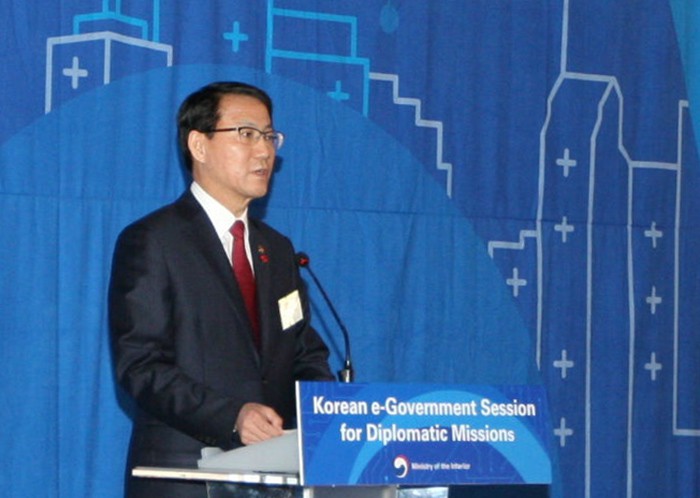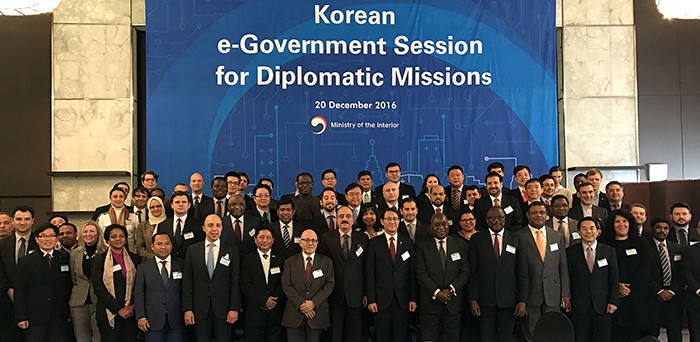
Vice Minister of the Interior Kim Sung-lyul expresses the Korean government’s will to extend e-government cooperation at the Korean e-Government Session for Diplomatic Missions at the Plaza Hotel in Seoul on Dec. 20.
The Korean e-Government Session for Diplomatic Missions was held in Seoul on Dec. 20 amid high interest of foreign envoys. The session aimed at introducing Korea’s e-government systems and future direction of international cooperation.
The gathering was attended by 73 diplomatic envoys from 61 countries, including ambassadors from Portugal and the South African Republic. The country of origin of attendees was relatively evenly spread across the regions, not just focusing on certain areas.
Envoys from Southeast Asian countries attended the session which was also attended by diplomats from African countries including Algeria and Kenya. The session also involved European diplomats who were from the E.U. and the U.K. Other attendees were from Central and South American regions such as Honduras and the Dominican Republic. Envoys from the Middle Eastern region such as Iraq and Jordan also attended the gathering.
The session was composed of two sessions designed to introduce Korea’s e-government and international e-government cooperation programs such as invitational training and cooperation forums. The first session informed the participants about the key to Korea’s e-government success, and its future basic plan dubbed “e-Government 2020” which aimed at realizing a vision under the motto “Enjoy your e-Government.”
In the second session, successful e-government cases were presented. These cases included Smart City Policy of the Seoul Metropolitan Government which aims at transforming Seoul into the city of “Internet of Things,” the e-patent system of the Korean Intellectual Property Office, The National Computing and Information Service of the Ministry of the Interior, the e-Resident Registration Cards of the Korea Local Information Research & Development Institute, and the Digital budget and Accounting System of the Korea Public Finance Information Service. These are some of popular e-government systems for which overseas countries have requested Korean cooperation.

A total of 73 diplomats from 61 countries attended the session, proving their high interest in e-government cooperation with Korea.
Private firms that developed such e-government systems with the government also participated in the session. Such firms included Sysone which developed the immigration screening system and the KOMSCO which developed the e-Resident Registration Cards. These firms demonstrated how the Korean immigration screening system works, and displayed the actual Resident Registration Cards, allowing the session attendees to experience firsthand e-government systems.
Korea has been actively broadening the horizons of e-government cooperation. According to the Ministry of the Interior, Korea has so far signed memorandums of understanding with 42 countries and four international organizations to form cooperative relationships. For the last five years, approximately 1,500 high-profile overseas officials have visited Korea to share in the knowhow and expertise in e-government possessed by Korea.
Korea has been actively working together with Southeast Asian countries, including Indonesia, where Korea built an e-government cooperation center this May. Korea has been cooperating with countries in the Black Sea region, including Turkey, Serbia. The country has been also working closely with the Digital 5 countries — the U.K., Estonia, Israel, New Zealand — as one a member.
By Yoon Sojung
Korea.net Staff Writer
Photos: Ministry of the Interior
arete@korea.kr























